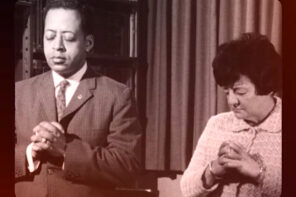A few years ago during a college break, when my floor was deserted and peaceful, a middle-aged couple stopped by my office door looking for someone who taught religion. “We’re from the Unification Church,” the man said. I gasped. The Moonies! was my immediate, rather graceless thought. With great excitement, and flashbacks to news reports of mass weddings dancing through my head, I composed myself and invited them in to chat. They seemed pleasantly surprised that I knew what the Unification Church was and, perhaps most of all, that I hadn’t shut the door in their faces.
I learned that the husband, an American from the upper Midwest, and the wife, a Brazilian, had first met each other on the day of their wedding at Madison Square Garden in 1982, when the Reverend Moon matched them up as part of his mission to create world peace—a grassroots, bubble-up kind of world peace that began at home.
This couple, still married after three decades, had overcome a language barrier and the awkwardness of living with a stranger, worked through the usual stresses of marriage, raised four children, and bought a small business. More remarkably, they were still believers that the Reverend Moon was finishing the work Jesus had started, by making his kingdom a reality on Earth, here and now.
The couple agreed to come speak to my World Religions students later than year, and on their way out they gave me a copy of Moon’s autobiography, As a Peace-Loving Global Citizen. I opened the book only because I felt obligated, but I quickly found myself engrossed by Moon’s story. Apart from the Korean particulars, it was a biblical-sounding account of poverty, conversion, persecution, imprisonment, miracles, and finally, rise to prominence. (His wife’s path was the “backwards and in high heels” version.)
As someone whom faith has eluded, I couldn’t help but marvel at his apparently miraculous experiences, and admire his steadfast pursuit of his mission. Such a story is not entirely unique; the similarities between his and other Christian memoirs were striking—for example, Brother Yun’s The Heavenly Man, which became a “Christian Book of the Year” (2003). But unlike Yun, Moon is considered a “cult” leader.
We Knew Him Too Well
We generally have two options when encountering other people’s religious stories. Our first is to dismiss them by reducing them to some other factors. Psychology, socioeconomics, biology, or simple intelligence are typical favorites among nonbelievers; e.g., Moon was a crazy or a crook who took advantage of stupid, poor, or otherwise vulnerable people. Believers, on the other hand, prefer to reduce their opponents by way of idolatry, sin, or deception by demonic forces. Perhaps even more than secular observers, members of traditional religions with conveniently invisible prophets and messiahs may be especially tempted toward smugness upon Moon’s death. It is not simply that he died (which all previous prophets and messiahs have also done); it’s that he had the bad grace not to be martyred and to live a very long time. Moreover, he hasn’t until now existed in the distant past; on the contrary, he lived in the information age, such that we simply know too much about him to allow for any mystery.
The following provides a tidy illustration of reductive dismissal, with both secular and religious flavor:
“As for Moon himself, he was clearly a charlatan, and there have been plenty of stories from people who have testified to the cult-like techniques that his church engaged in, and the world has long been familiar with some of there [sic] more bizarre practices such as mass marriages of people who’ve never actually met each other. Given that it was largely a cult of personality, though, one has to think it won’t survive long past his death. After all, messiahs don’t generally die unless they’re going to rise three days later.”
While this may express a common reaction, it deserves interrogation. Moon did not invent arranged marriages; it is impossible to know what he believed; every new religion faces critique from older religions; and many social scientists now admit that any distinction between “cult-like techniques” like so-called mind-control, “coercive persuasion,” and other more “normal” sorts of education or socialization, is in the eye of the beholder. In short, the Unification Church’s beginnings are not particularly radical when compared to other religions’ beginnings. So while it is certainly convenient (and mentally satisfying) to ridicule and dismiss, it also prematurely shuts down any meaningful reflection or conversation between different worldviews.
Our other choice—and, I think, a better choice—is to accept, even respect, others’ experiences as their experiences, even if they don’t make sense in our own world.
This isn’t easy, I’ll admit; Moon’s unbelievable autobiography, his later congressional coronation, questionable business practices, and family squabbles all put my posture of respect to the test, to say the least. (The Catholic Church and the Westboro Baptist Church do the same.) But ultimately I have decided to assume he was working in good faith. Not dismissing him as a charlatan doesn’t mean I agree with his teachings on sexuality or his economic behaviors; it doesn’t mean I believe he was anointed by God to do any particular salvific work on my behalf. It simply means that I must take Moon seriously, as if he were, well, an actual human being who tried to pursue happiness and avoid suffering, and who probably succeeded and failed at both in equal measure. I can empathize with him at that most basic level; I’ve never claimed to be God’s anointed, but I certainly say and do plenty of things that others question or that I later regret.
Smugness is tempting; it seems so obvious that the splash Moon once made was just that, an insignificant splash, rather than an Earth-shaking tsunami. And yet, dismissal is bad policy, if only because it destroys the possibility of future interreligious relations. Moon’s apparent lack of success may turn out to be a red herring. Historically, all prophets worth their salt say things that are offensive to a majority of folks in their communities—otherwise they’re not “prophetic.” Jesus is reported to have said that “no prophet is accepted in his hometown.” Perhaps it is also true that no prophet is accepted in his own time.




